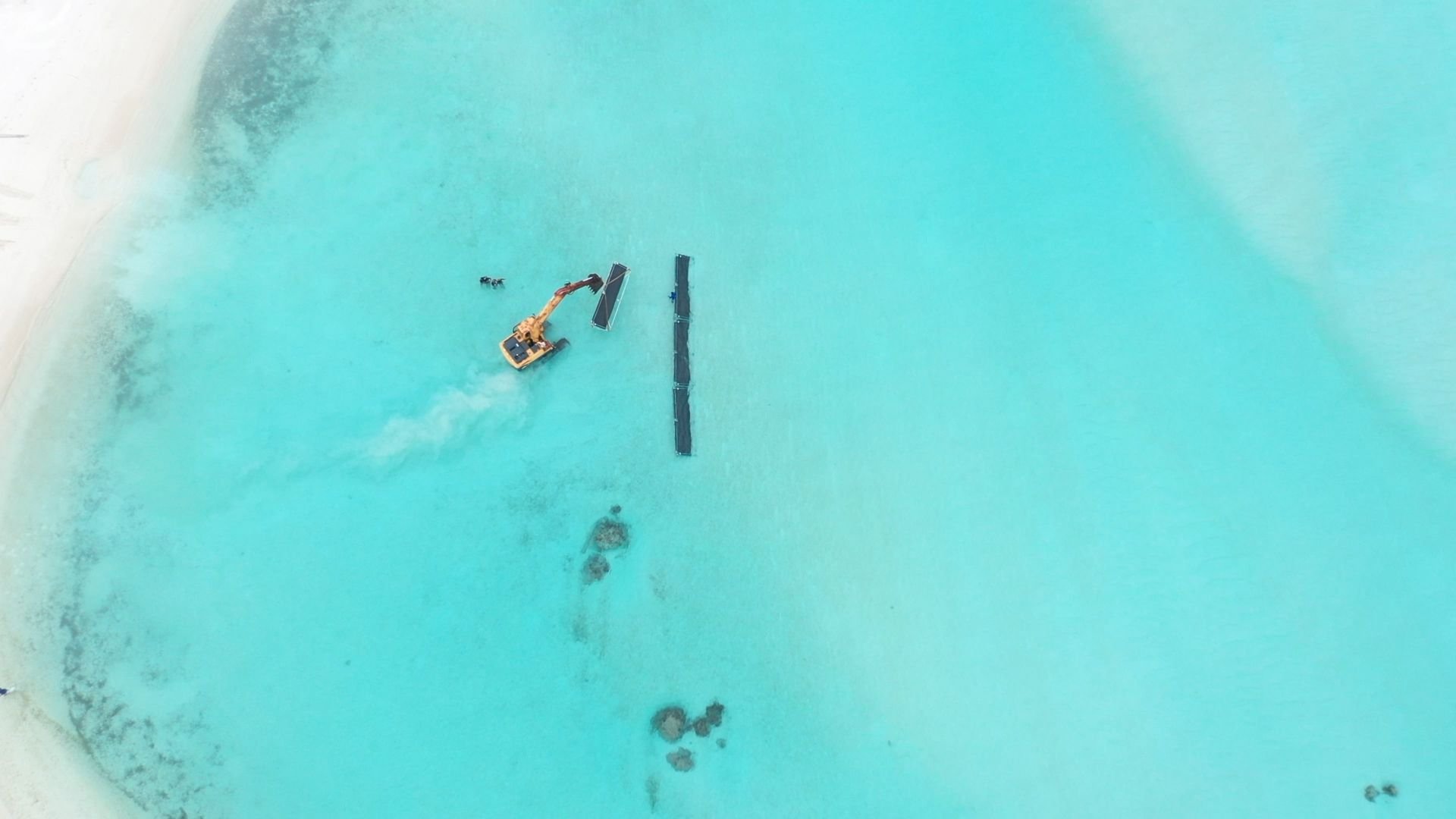Talks
Learn about our ocean and reefs and be inspired by wonderful work people are doing to protect and support the health of our ocean ecosystems
Photo credit: Alex Mustard
OPENING KEYNOTE
Coral reefs matter and they need our care and protection
Callum Roberts,
Professor of Marine Conservation, University of Exeter, UK,
Scientific Advisor to the Maldives Coral Institute
Wherever you are in the Maldives, whether above or below water, you are surrounded by the work of corals. Coral animals built the reefs and islands of this country over thousands of years and protect and sustain them today. Corals are sensitive animals though, easily damaged by human activities and at increasing risk from climate change. For most of human history, we have taken corals and all that they do for us for granted. But if the Maldives is to prosper in the future, that neglect must change to active protection and stewardship across every atoll, every business and every citizen of the nation. This scene-setting talk for the festival will explain what corals are, why they matter, how they are threatened, and what we can do to help them.
KEYNOTE
Debt for Nature Swap and the Conservation of marine resources: Seychelles’ Experience
Minister Flavien Joubert- Minister for Agriculture, Climate Change & Environment of Seychelles
Seychelles benefitted from the Debt for Nature Swap in 2016 with the assistance of TNC, which helped lay the foundation for innovative financing for marine conservation programs. This agreement not only helped Seychelles in reducing its debt burden but also provided much-needed funding for conservation measures with the establishment of the Seychelles Conservation and Climate Adaptation Trust (SeyCCAT). With Seychelles setting aside 30% of its exclusive economic zone for marine protection, the country is on a trajectory of increased climate adaptation measures, and is better positioned to partner and champion marine protection locally, regionally and globally.
KEYNOTE
Can we harness biology to save coral reefs?
Professor Madeleine JH van Oppen
Australian Institute of Marine Science
University of Melbourne
The decline of coral reefs is primarily caused by climate change, and urgent action is needed to prevent further loss. It is widely agreed that we should take measures to (1) reduce greenhouse gasses in the atmosphere, (2) improve local conditions such as water quality through conventional management, and (3) develop interventions for restoring coral reefs and preserving existing reefs until climate change can be controlled and natural coral reef recovery can occur.
One such intervention is assisted evolution, which involves accelerating naturally occurring adaptive processes to enhance coral heat tolerance. Assisted evolution can be directed towards the coral host animal or its associated microorganisms. My presentation will highlight the advancements made in this area.
Our Ocean and our Economy
Minister of Economic Development Fayyaz Ismail
Talk abstract coming soon
Planning for the Future of Our Ocean
Noo Raajje
How do we plan for our prosperous future in the Maldives? Noo Raajje is developing a plan to protect and sustainably manage our ocean for future generations to come. The team recently completed the world’s largest Ocean Use Survey representing how 25,000+ Maldivians use and value the ocean space. Attend a presentation with the Noo Raajje team to learn about the nationwide survey effort and future opportunities to get involved in shaping the future Maldives Marine Spatial Plan.
Noo Raajje is a partnership between the Government of the Maldives and the Blue Prosperity Coalition to protect the ocean and its resources to build a bright future for communities, the economy, and the environment.
The program will also promote the advancement of Maldivian ocean science and stewardship through research, education, capacity building, and outreach, including collaborating with and providing support to local scientists and civil society.
@nooraajje @waittinstitute #NooRaajje #BlueProsperity #BlueEconomy
Why protect the ocean? What science tells us
Dr. Emanuel Gonçalves
Chief Scientist and Member of the Board of Directors of Oceano Azul Foundation
Today science is clear in showing that we are facing two existential challenges: a climate emergency and a species extinction crisis. Globally, the international community has agreed to protect 30% of the land and ocean by 2030 in response to the urgency to stop the degradation of the Planet’s life support systems. Despite the dire state of the ocean ecosystems and the urgency to implement effective policies and management solutions, we continue to witness the loss of nature and, with it, the loss of economic and social value. Marine protected areas (MPAs) are one of the most effective solutions to address these challenges. There is however the need to clarify how these tools work, how can they maximize benefits and why, what are the conditions for their effectiveness, and how to adopt a strategy to increase the speed, size and impact of efficient MPAs to save what is left in the ocean, allow fish stocks to replenish and recover, and build sustainable jobs and economic growth based on an intact and thriving environment.
Historical trends in the condition of Maldivian coral reefs
Rhiannon Davies, PhD Student at the University of Exeter, UK
Research Officer for the Maldives Coral Institute
Maldivian reefs were among many that were badly affected by the 1997-98 and 2015-16 global bleaching events, experiencing severe losses in coral cover. To piece together a detailed picture of the long-term response of corals to bleaching events across the Maldives, we have collated the largest dataset of Maldivian coral cover to date. From the earliest study in 1957 to the present, we have incorporated over 570 surveys from scientific publications, Environmental Impact Assessments and two major expeditions: the Catlin Seaview Survey in 2015 and the Waitt Institute expeditions in 2020/21. This talk will describe long-term trends in the fortunes of Maldivian corals, through repeated phases of collapse and recovery.
Maldives Aquanauts - Exploring the Depths
Nekton
Join some of Maldives first Aquanauts - the first people to explore the deep sea - for a unique behind the scenes insight into their experiences, submersible dives and discoveries during the Nekton Maldives Mission.
Hope Grows in the Maldives
Jos van Oostrum, Senior Director, Mars Sustainable Solutions Mars Incorporated
In 2021, Maldives Coral Institute and Mars joined forces to enable community-led restoration of degraded reefs in Fulhadhoo, Baa Atoll, which is showing encouraging results in terms of coral growth and fish presence.
This partnership embodies the spirit of the coral reef restoration journey we have embarked on with partners around the world - captured on www.buildingcoral.com – which began way back in 2006, in Sulawesi, Indonesia.
The approach is to carefully choose sites where restoration is both necessary and suitable, work with and train local partners and communities to build capacity, attract investment, and monitor restored reefs to ensure positive ecosystem impact. To expand the global reach, a bigger and more diverse audience is needed to reach scale. This is when Hope Reef was built in Indonesia, using Reef Stars to spell the word HOPE as a visible beacon, to kickstart a Hope Grows movement. Smart, high-quality restoration with and by partners who depend on reefs, aimed at delivering a specific function depending on the location and partner’s needs, lies at the heart of this movement. We are pleased to share the success and evidence with you today and welcome everyone willing to join!
Building with Nature
Invena and MIT’s Self-Assembly Lab
In this presentation, INVENA and MIT’s Self-Assembly Lab will talk about their on-going research in the Maldives focused on developing natural methods for creating sand accretion. Their work brings together their latest research from MIT through computational and physical simulations paired with full-scale field installations in the Maldives which are then monitored for sand accretion through satellite, drone and physical measurements. Their work spans topics from promoting sand emergence, to stabilisation through vegetation, as well as earth observation analysis and prediction, and even developing local materials for novel construction methods above and below the surface of the water.
Maldives Resilient Reefs MicroTalks
Maldives Resilient Reefs (MRR) exists to restore Maldivian coral reefs as climate resilient ecosystems for the benefit of people, nature and the economies that depend on them. MRR’s strategic intervention areas are: 1) Increasing effective marine protection to build climate resilience; 2) Improving the sustainability of reef-based fisheries; 3) Improving environmentally responsible tourism and 4) Strengthening local capacities for marine resource management. MRR is officially affiliated with UK charity, Blue Marine Foundation. We present three short talks on our work:
Sustainable reef fishing (Afaaz Zahid )
Laamaseelu Masveriyaa programme - a sustainable resort reef fishery model for the Maldives to ensure that the seafood sourced by tourism operators is caught in an equitable and sustainable way, with minimal ecological impact on the marine environment.
Community Conservation Areas (Mohamed Naufal Shiyam)
Maldives’ first Community Conservation Area in Laamu Hithadhoo to protect a critical grouper spawning site and a manta ray cleaning station
The impact of nitrogen on coral reefs and seagrasses (Aishath Mufliha Ziyadh)
Investigating the impact of nitrogen on coral reefs and seagrasses of the Maldives.
Why We Want to Conserve Manta Rays and Our Maldives Marine Ecosystems?
Manta Trust
Whether we realise it or not, our lives and livelihoods, especially in the Maldives, are inherently connected to the environment and ocean around us. We want to share with you, through our collective experiences, why it is important that we protect manta rays and the ecosystems they are a part of.
Coral Restoration Program at Soneva Fushi
Soneva
The presentation is explaining the different methods used at Soneva Fushi in order to restore the surrounding coral reef. It includes ex-situ (spawning lab) and in-situ (nurseries, relocations and outplanting) projects.













